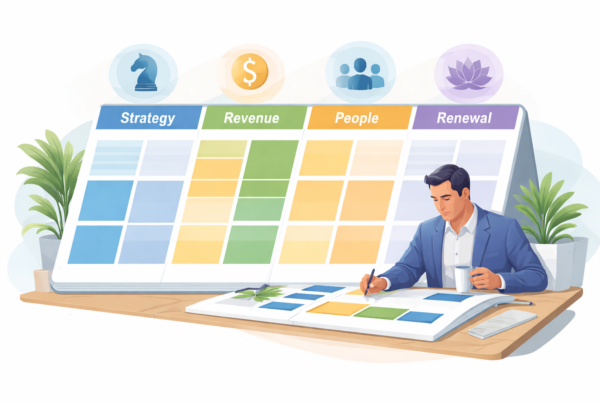Essential Strategies for Leadership and Coaching Success
Want to enhance your leadership and coaching skills? This article provides practical strategies to help you motivate your team, improve communication, and achieve your goals.
Key Takeaways
- Effective leadership coaching enhances individual and organizational performance through clear communication, emotional intelligence, and a focus on personalized goal-setting.
- Investing in coaching helps develop essential skills in leaders, fostering a culture of continuous improvement and adaptability within organizations.
- Tailored coaching programs must address the unique challenges faced at different levels of leadership to ensure sustainable growth and long-term success.
Essential Strategies for Leadership and Coaching Success

The ultimate aim of leadership coaching is to positively impact clients’ lives, motivate them, and help them overcome challenges. Every coaching session offers a chance for growth and learning, highlighting the need for coaches to recognize their own strengths and weaknesses to build trust with clients. Recognizing these strengths and weaknesses is the first step towards effective coaching and creating a supportive environment.
Effective communication and emotional intelligence are crucial in executive and leadership coaching. An executive coach can help senior leaders develop these skills, fostering better relationships with their teams and clients and promoting a clear understanding and alignment toward common goals. Setting realistic and attainable goals is another vital strategy in coaching, helping to maintain motivation and achieve meaningful outcomes.
Leadership coaching focuses on improving both individual and organizational performance. When coaches concentrate on the client’s needs and practice active listening, they can create a positive impact that resonates throughout the organization. This holistic approach fosters both personal and organizational growth, leading to a more fulfilling and successful coaching experience.
Introduction
Leadership coaching plays a pivotal role in enhancing the skills of internal managers and HR professionals within organizations. Whether you are a seasoned leader or just beginning your leadership journey, the strategies discussed in this blog post will provide valuable insights and practical tools to help you develop your leadership abilities. The Executive Leadership Coaching: Mastery Session is designed for individuals with at least three years of experience or 100 hours of coaching experience, preparing participants to delve into advanced coaching techniques.
Investing in leadership coaching allows organizations to strengthen internal talent and foster a culture of continuous improvement. Programs like the Leadership Coaching Strategies are specifically tailored for internal managers and HR professionals, making them ideal for those looking to enhance their coaching skills and drive organizational success.
Exploring the various aspects of leadership and coaching will provide a comprehensive understanding of how to use these strategies to achieve career and organizational objectives.
Ready to unlock your leadership potential and take your coaching skills to the next level? Book a free 15-minute discovery call today to explore how tailored coaching strategies can elevate your career. Click here to schedule: https://calendly.com/joelzimelstern1/15min.
Defining Leadership and Coaching
Leadership coaching forms a partnership between the coach and the leader, aiming to realize the leader’s full potential and enhance both personal and organizational performance. The ultimate goal of coaching is to positively impact clients’ lives, assisting them in overcoming challenges and maintaining motivation through every session. This transformative process is built on the foundation of clear communication, ensuring that clients understand their goals and the steps needed to achieve them.
Setting realistic, attainable goals is crucial for maintaining motivation and achieving meaningful outcomes in coaching. A pragmatic approach, combined with active listening and focusing on the client’s needs, fosters successful coaching relationships.
Developing a personalized leadership style that aligns with one’s identity and organizational needs enables leaders to become more effective and impactful in their roles.
Discover how personalized coaching can transform your leadership journey. Take the first step by booking a quick, no-obligation call with Joel Zimelstern. Let’s discuss your goals and challenges: https://calendly.com/joelzimelstern1/15min.
What is Leadership Coaching?
Leadership coaching is a personalized and systematic process designed to enhance the leadership abilities of individuals within an organization. It involves a collaborative partnership between the coach and the leader, focusing on developing self-awareness, improving effectiveness, and aligning individual growth with organizational goals. Effective leadership coaching addresses critical challenges in today’s business environment, such as acquiring, developing, and retaining top talent.
A leadership coach works closely with leaders to identify their strengths and areas for improvement. The coach helps them develop a deeper understanding of their leadership style and how it impacts their team and organization. Through this process, leaders gain valuable insights into their behaviour, decision-making processes, and interpersonal skills, which are crucial for driving organizational success.
By fostering self-awareness and providing targeted feedback, leadership coaching empowers leaders to make informed decisions, build stronger relationships, and navigate complex challenges with confidence. This transformative process not only enhances individual performance but also contributes to the overall success and growth of the organization.
The Role of a Leadership Coach
A leadership coach plays a critical role in guiding leaders through complex scenarios such as internal conflicts and organizational politics. Leadership coaches offer a sounding board for ideas, feedback, action plans, and accountability, helping leaders navigate challenges and improve work performance. Many companies are investing in leadership development through coaching to nurture internal talent and prevent stress and burnout for both leaders and their teams.
Effective leadership coaching is personalized, addressing each leader’s unique styles and needs. This tailored approach ensures that leaders can achieve their full potential and make a positive impact on their teams and organizations. Working with a leadership coach helps leaders develop communication skills and emotional intelligence, which are vital for fostering better relationships and enhancing overall performance.
Leadership coaches also help leaders manage stakeholder relationships and drive change within their organizations. This comprehensive support system helps leaders build resilience and adaptability, enabling them to thrive in fast-paced and ever-changing environments. Through effective coaching, leaders can not only improve their own performance but also inspire and motivate their teams to achieve greater success.
Key Benefits of Leadership Coaching

Leadership coaching plays a vital role in organizations that prioritize learning and employee development. It leads to better performance and personal satisfaction. Research indicates that about 70% of individuals who undergo coaching experience enhanced work performance and communication skills. This improvement in self-awareness and job satisfaction often translates to better teamwork and stronger professional relationships.
Empathy is a key component of effective leadership coaching. It allows leaders to connect with their employees on a personal level and enhance workplace relationships. Building psychological safety and trust is essential for leaders, as it enables open and honest coaching interactions. The ability to give and receive feedback is another critical coaching skill that fosters growth and performance improvement.
Leadership coaching is essential for fostering professional growth and enhancing performance, impacting both financial outcomes and personal satisfaction. Helping leaders identify their distinct leadership styles and establish both short-term and long-term career objectives, coaching strengthens professional relationships and improves self-regulation, a growth mindset, and effective communication skills, all while encouraging individuals to take charge of their own professional development.
70% of individuals report improved work performance and communication through coaching. Ready to see similar results? Book your free 15-minute session now to get started: https://calendly.com/joelzimelstern1/15min.
The Leadership Coaching Process
The leadership coaching process is a structured methodology that ensures the coaching engagement is tailored to the individual’s needs and goals. It typically involves four key phases: scoping and assessment, alignment and objectives, coaching and tracking, and closure and measurement.
- Scoping and Assessment: This initial phase involves a thorough evaluation of the leader’s current skills, strengths, and areas for improvement. Tools such as 360-degree feedback, interviews, and self-assessments are often used to gather comprehensive insights.
- Alignment and Objectives: In this phase, the leadership coach works with the leader to set clear, realistic, and attainable goals. These objectives are aligned with both personal aspirations and organizational needs, ensuring that the coaching process supports overall business objectives.
- Coaching and Tracking: During this phase, the coach provides ongoing support and guidance, helping the leader to develop new skills and strategies. Regular check-ins and progress tracking ensure that the leader stays on course and can make adjustments as needed.
- Closure and Measurement: The final phase involves evaluating the coaching engagement’s outcomes. This includes measuring improvements in leadership behaviour, performance, and overall effectiveness. Feedback from multiple stakeholders is often gathered to provide a comprehensive view of the leader’s development.
By following this structured approach, leadership coaching ensures that leaders receive the support and guidance they need to achieve their goals and drive organizational success.
Essential Coaching Skills for Leaders
Coaches help leaders develop essential hard and soft skills necessary for effective leadership. These skills include communication, decision-making, and problem-solving, which are crucial for navigating complex situations and making informed decisions. Leadership coaches also encourage adaptability, guiding leaders to embrace change and develop flexible strategies that can be applied in various scenarios.
Effective leaders enhance team performance by fostering an environment of motivation and collaboration. A good leadership coach challenges clients to think critically and develop sustainable growth strategies, ensuring that they are well-equipped to handle the demands of their roles and become better leaders.
Organizations that prioritize continuous learning and constructive feedback create a coaching culture that supports ongoing development and success.
Initial Assessment and Goal Setting
The coaching process starts with a thorough evaluation of the coachee’s current leadership skills and setting collaborative goals. Utilizing tools like 360-degree feedback and interviews can yield valuable insights into the coachee’s strengths and areas for improvement. This initial assessment is crucial for understanding the coachee’s needs and tailoring the coaching approach accordingly.
Goal-setting should be flexible to adapt to individual and organizational changes, especially during times of uncertainty. By setting realistic and attainable goals, coaches can help leaders stay focused and motivated throughout the coaching process. This collaborative approach ensures that the objectives align with both personal and organizational growth.
Developing a Personalized Coaching Plan
Once the initial assessment is complete, the next step is to develop a personalized coaching plan that aligns with the unique needs of both the individual and the organization. This plan should address the specific developmental needs identified during the assessment, ensuring that the coaching process is tailored to achieve the desired outcomes.
A customized coaching plan maximizes performance by focusing on the areas that require the most attention. Addressing these specific needs allows leaders to develop the skills and strategies necessary for their roles, leading to more effective coaching and greater overall success.
This personalized approach ensures that the coaching experience is both relevant and impactful.
Ongoing Coaching and Feedback
Continuous feedback is crucial for adapting and refining the coaching strategy as necessary. Engaging in ongoing coaching allows leaders to discuss real-time challenges, facilitating practical solutions and continuous improvement. This dynamic process ensures that the coaching plan remains aligned with the coachee’s evolving needs and goals.
Active listening skills are vital for leaders to diagnose problems effectively and guide their teams. Coaches can help leaders navigate challenges and achieve their objectives by maintaining open lines of communication and providing regular feedback. This ongoing support fosters a culture of continuous learning and development, leading to sustained success.
Effective Leadership Coaching Strategies
Effective leadership coaching strategies involve a combination of intrinsic and extrinsic motivation, accelerated learning, and specific, needs-based coaching focus. A skilled leadership coach employs a variety of techniques to help leaders develop new skills and gain confidence.
- Intrinsic and Extrinsic Motivation: Effective coaches understand the importance of both intrinsic and extrinsic motivation. They help leaders identify their internal drivers and align them with external rewards and recognition, creating a balanced approach to motivation.
- Accelerated Learning: Leadership coaches use techniques such as experiential learning, role-playing, and real-world scenarios to accelerate the learning process. This hands-on approach helps leaders quickly apply new skills and strategies in their daily roles.
- Needs-Based Coaching Focus: A personalized coaching approach ensures that the coaching engagement addresses the leader’s specific needs. By focusing on areas that require the most attention, coaches can help leaders develop targeted skills and strategies that are directly applicable to their roles.
- Active Listening and Open-Ended Questioning: Effective coaches use active listening and open-ended questioning to encourage leaders to reflect on their experiences and explore new perspectives. This helps leaders gain deeper insights and develop critical thinking skills.
By employing these strategies, leadership coaches can create a supportive and effective coaching environment that fosters growth, development, and long-term success.
Overcoming Challenges in Leadership Development

Common challenges in leadership development include acquiring, developing, and retaining top talent and driving business performance. Many leadership programs fail because they do not cater to leaders at all stages of their career cycles. Additionally, leadership development materials are often not retained because they are not applied to the job.
Balancing urgent day-to-day operations with long-term leadership development planning poses a significant challenge for many organizations. Coaching fosters a sustainable development approach by equipping leaders with the skills necessary for ongoing growth and transformation. Cultivating a growth mindset is essential for leaders to encourage continuous development and adaptability in their teams.
Providing adequate stretch assignments is crucial for the real-world application of leadership skills and knowledge. However, a lack of accountability can prevent the effective application of newly acquired skills in the workplace. Addressing these challenges with targeted coaching strategies allows organizations to enhance leadership development efforts and achieve greater success.
Measuring the Impact of Leadership Coaching
Measuring the impact of leadership coaching is essential to ensure improvements in leadership skills and overall effectiveness. Comparing performance reviews before and after coaching can reveal significant enhancements in leadership behaviour and outcomes. Conducting 360-degree reviews post-coaching helps assess changes from multiple perspectives, providing a comprehensive view of the coachee’s development.
Tracking customer satisfaction and employee retention rates following coaching initiatives can gauge long-term organizational performance. Building a narrative around coaching outcomes is essential for securing stakeholder support and demonstrating ROI. Qualitative data, such as testimonials and interviews, can complement quantitative metrics to illustrate the broader impact of leadership coaching.
Using these measurement techniques helps organizations effectively track the progress and success of their leadership coaching programs. This data-driven approach ensures that coaching efforts are aligned with organizational goals and contribute to sustained growth and development.
Leadership Coaching for Different Levels

Leadership coaching must be tailored to different organizational levels, as leaders face distinct challenges at various stages of their careers. Advanced coaching techniques for senior leaders focus on managing stakeholder relationships and driving change, while programs for emerging leaders may emphasize foundational skills and personal development.
Tailored coaching programs are essential for addressing the unique needs of leaders at different levels. By focusing on specific coaching lenses, such as executive or organizational leadership, leaders can choose programs that align with their interests and career goals.
This personalized approach ensures that leaders receive the support and guidance they need to succeed in their roles.
Implementing Leadership Coaching Across Organizations

Implementing leadership coaching across organizations involves several key steps, including setting key performance indicators (KPIs) from the start to monitor progress and make necessary adjustments. Utilizing technology in leadership coaching offers a cost-effective and systematic approach, enabling organizations to scale their coaching efforts efficiently.
Successful coaching programs require consistent support from senior leadership to ensure alignment with strategic objectives and foster a culture of continuous improvement. Surveys that track leader participation and satisfaction can provide valuable insights into the effectiveness of coaching initiatives. Additionally, new methods of leadership coaching, such as hybrid, peer, and group coaching, facilitate effective coaching experiences across organizations.
Incorporating these strategies enables organizations to optimize productivity and performance levels while developing self-awareness and improving effectiveness among their leaders. This comprehensive approach ensures that leadership coaching efforts contribute to long-term organizational success.
Leadership coaching is your gateway to growth, transformation, and success. Don’t wait to start achieving your goals. Book a free consultation now and take the first step toward becoming the leader you aspire to be: https://calendly.com/joelzimelstern1/15min.
Organizational Success Through Leadership Coaching
Leadership coaching is an essential tool for organizational success in today’s fast-paced business environment. By developing the leadership abilities of individuals within the organization, leadership coaching can help to improve employee engagement, increase productivity, and drive business results.
Effective leadership coaching addresses critical challenges such as succession planning, talent development, and change management. By preparing leaders to navigate these challenges, coaching ensures that organizations have a strong pipeline of capable leaders ready to step into key roles.
Leadership coaching also fosters a culture of continuous improvement and adaptability. By encouraging leaders to embrace change and develop flexible strategies, coaching helps organizations stay competitive and responsive to market demands.
Moreover, leadership coaching enhances employee engagement by creating a supportive and motivating work environment. When leaders are equipped with the skills to inspire and motivate their teams, employees are more likely to feel valued and committed to their work, leading to higher levels of productivity and job satisfaction.
In summary, leadership coaching is a powerful tool for driving organizational success. By investing in the development of their leaders, organizations can create a positive and productive work environment that supports long-term growth and achievement.
Choosing the Right Leadership Coaching Program
When choosing a leadership coaching program, it’s important to evaluate its structure, including its duration, format (in-person or online), and whether it includes mentorship opportunities. It’s also crucial to investigate who will instruct the program, as their expertise and personality can significantly impact the learning experience.
Program costs can vary widely, so be prepared for potential expenses and inquire about financial support options from employers. Considering these factors will help you choose a coaching program that aligns with your needs and career goals.
Finding the perfect coaching program starts with a conversation. Schedule your complimentary 15-minute call today to learn how my leadership coaching services can align with your career aspirations: https://calendly.com/joelzimelstern1/15min.
Summary
In summary, leadership coaching is a powerful tool for personal and organizational growth. By developing essential coaching skills, setting realistic goals, and implementing tailored coaching programs, leaders can achieve their full potential and drive organizational success. Measuring the impact of coaching and overcoming common challenges ensures that coaching efforts are effective and sustainable.
As you embark on your leadership journey, remember that continuous learning and development are key to becoming a better leader. By investing in leadership coaching, you can unlock new opportunities for growth and transformation, ultimately leading to greater success for yourself and your organization.



